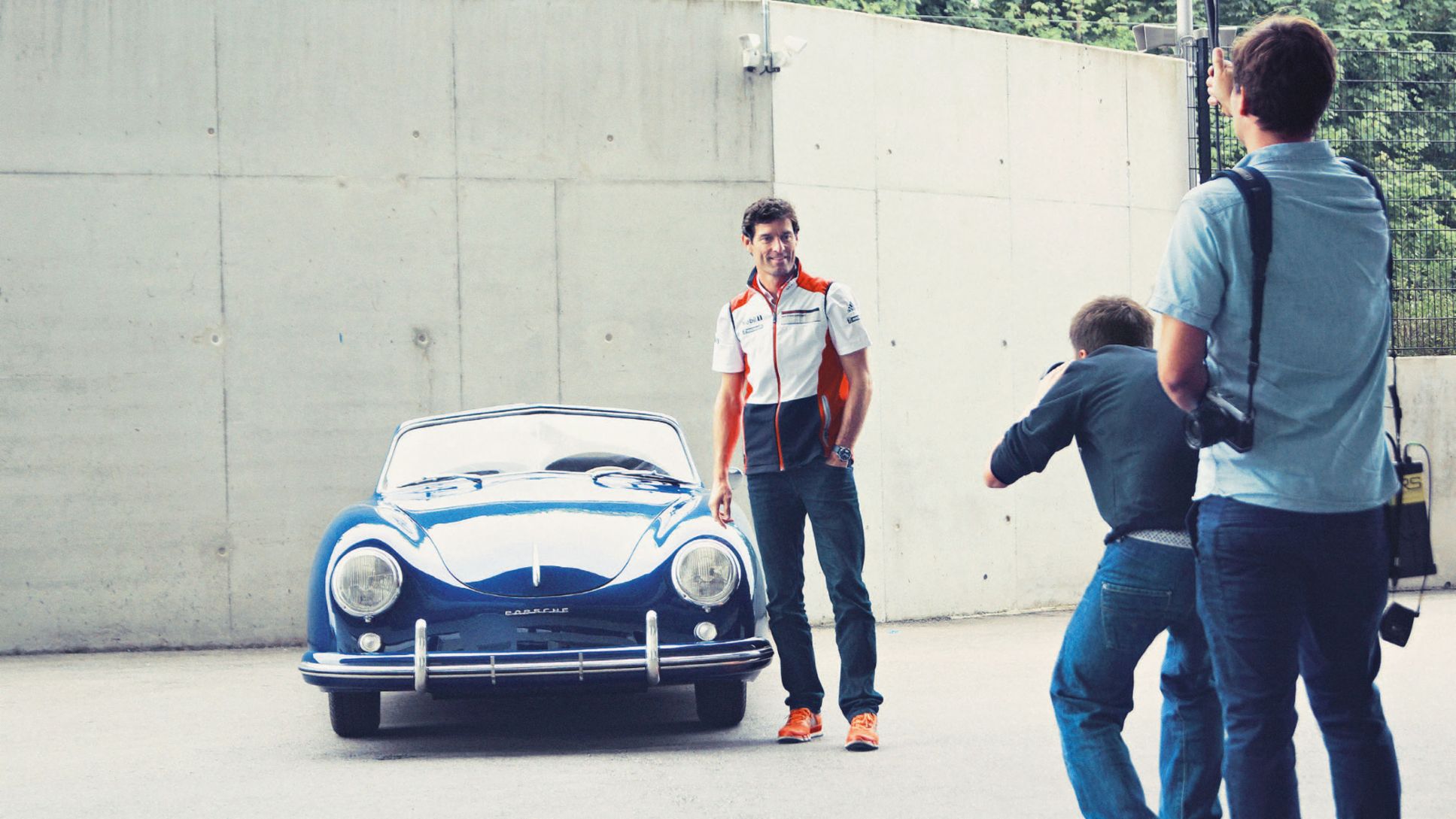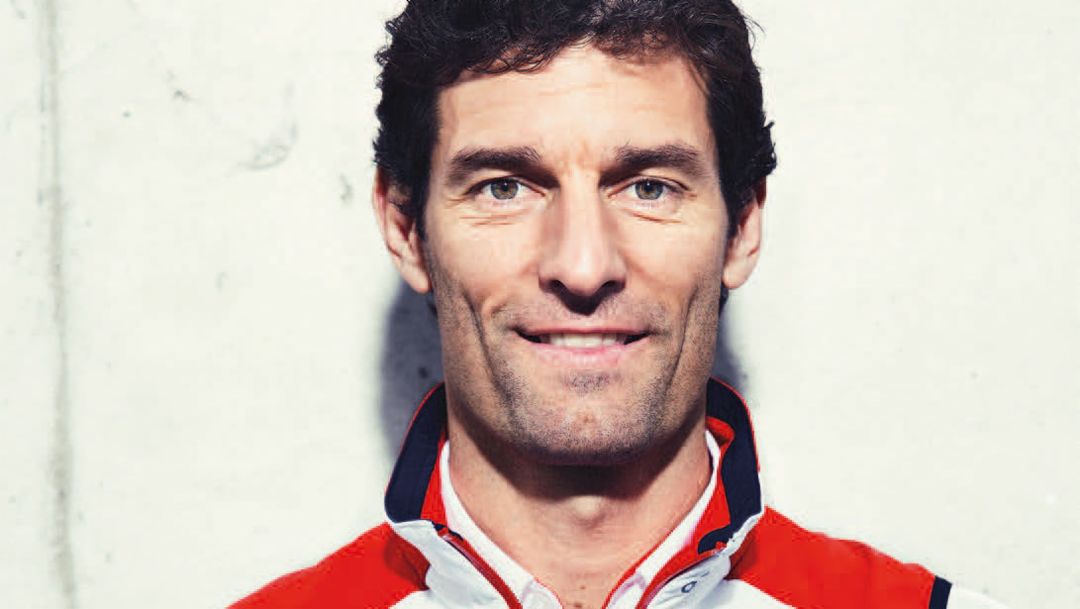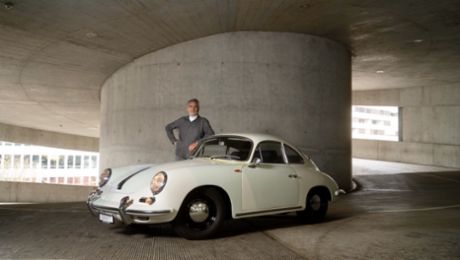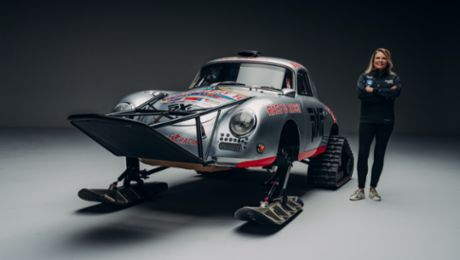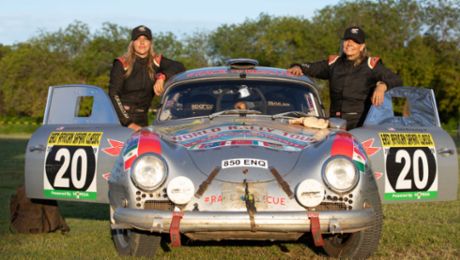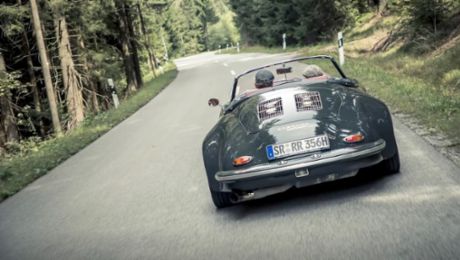There he is. Smack in the middle of the workshop at the Porsche Museum. He looks much shorter and smaller than in photos. Yet his face seems as familiar as always. Although he was born some decades ago, he doesn’t look his age at all. His complexion is fresh and radiant, almost like that of a teenager. A dark blue.
Right next to this Porsche 356 Mark Webber is standing. A race driver, globetrotter and superstar. But the way he’s standing there, relaxed in his sneakers gazing at this Porsche – his Porsche – with a happy smile, well, he looks like an ordinary guy from Down Under. A guy whose dream has come true.
He will keep this smile on his face during the entire interview. And after watching him look at the car for a while, you don’t need to bother asking “why“…
Mark Webber on the 356:
Just look at it. What a body. Wonderful! If Marilyn Monroe were a machine, she would definitely look like this 356.
Did it take a long time to find “Marilyn“?
I admit it wasn’t that simple. I wasn't looking for a 356 in particular but basically for a car with a timeless design. That doesn’t give you an awful lot of choice. The look is a really important aspect to me. The design has to be appealing. And so does the entire shape of the car. The 356 meets all these demands.
The car is in perfect condition. Where did you find it?
In Germany, in Bavaria to be more precise. But it didn’t look like that when I bought it. To be honest, the car was in terrible shape. But after a few intensive hours of treatment at the cosmetician, it shines as brightly as ever and is certainly one of the most beautiful of its kind in the world.
Mark Webber is gazing at this Porsche — his Porsche 356 — with a happy smile and well, looks like an ordinary guy. A guy whose dream has come true.
So that means that race driver Mark Webber, the man whose profession means pushing the functionality of an automobile to the limit, is enthused by the simple shape of a car?
At least for the most part, yes. Absolutely. Then again, I'm also fascinated by the era of beautiful women like Marilyn. I just love that timeless feeling of the 1950s.
Which part of the 356 is most appealing to you?
Definitely the dashboard. These small and round instruments, the thin, almost fragile steering wheel. And it’s a very simple car, everything is clearly arranged, it’s very compact. There are three instruments: speedometer, rev counter and heat indicator. The co-driver is sitting right next to the driver. There's room for a sheet of paper between the two but not more than that.
The more time Mark Webber spends looking at his 356 the more he waxes poetic. He’s thrilled by every detail, the split windshield, the taillights. The roof has long been folded down, opening up the view. And of course just a moment later, he’s sitting in his car. The door refuses to latch shut at the first attempt, so Mark Webber is giving it another try, this time with more determination.
A mechanical “clunk!“ and the door is shut. Mark Webber is happy. “It’s a Porsche! What else?“ And instantly that charismatic, debonair smile reminds me of George Clooney. And makes me wonder how goddam old Clooney must be by now... Time and again, Mark Webber averts his gaze and dedicates all his attention to the beauty of his car. Like a little boy who notices a girl’s beauty for the very first time. And I wonder if this race driver bought this car just to look at it…
The dashboard is the most appealing part of the 356. These small and round instruments, the thin, almost fragile steering wheel.
So you’re just looking and touching it? Don’t you want to drive the car?
A little, yes. Not much, though. I just love looking at this car. Of course, I’d also like to drive it and I certainly will if there is an opportunity.
Right now, for example? Mark Webber gives the mechanic a questioning look. The latter is nodding benevolently. Then Mark Webber is turning the key... No response. Webber is giving it another try... Again nothing. The mechanic comes running. Mark Webber gets off and slouches a little way off from his car, while the mechanic attends to “Marilyn“. “That’s normal with a car like this,“ he says smiling with ease. “This kind of car needs a bit of extra affection.“ We use the time to go on with our interview…
What does the Porsche family mean to you?
Even before I came here, I already knew it would be unique. But to be honest, I didn’t think it would be this unique. The way they welcomed and accepted me as a new driver here really stunned me. I’m just one of many drivers. Ok, there was a time at the F1, but at the end of the day, I’m just the guy from Australia, so why should I be more accepted than anybody else. It was a great and very warm welcome at the beginning, nobody put me on a pedestal or anything, I was just very well received. That’s something that really works ideally here at the Porsche family.
Do you think that’s typical of Porsche?
That and the emotion that Porsche conveys about its past. You are well aware of the company history at all times and you just feel the myth, everything behind what you’re driving down the street. That’s what makes the brand so strong and also romantic to a certain extent.
“The way they welcomed and accepted me as a new driver here really stunned me.“
Your work tool, the 919 hybrid, is the innovative spearhead of the house. Have you ever driven one of the old race cars?
Depends on what you mean by “old“. I’ve driven the 911 GT1 from 1998. But thinking about really old cars that I’ve driven, a Lotus comes to mind spontaneously, one of Jochen Rindt’s cars. It was the worst car I’ve ever driven. Horrible.
What’s the biggest difference to old cars?
Definitely the grip. What has changed least is the power, you had that in these days too. Today, the engines are of course much more efficient. Another thing that has been significantly improved are the materials used and the techniques of processing and molding them. This again leads to other innovations and opportunities in terms of aerodynamics. Compared to the past, we might not have more power, but we’re able to brake much later and far more abruptly. Thanks to the automatic transmission, we clutch much faster and take bends considerably faster too.
Let’s talk about Le Mans. After such a performance, what do you now expect for the coming year?
I think we can be proud of our performance. That’s also what I said to the team immediately after the race. And that’s what we are taking home from Le Mans this year. Now we want to lead the race after 22 hours in 2015 too, but that will mean a whole lot of work again. We shouldn't think that we will make it again next year just because we were leading this year. That’s not my mentality or that of Porsche, either. We have to continue to work hard, respect the competitors, but we want to repeat our performance next year and then bring the car back home as well.
Is the pressure higher now?
With success comes expectation. But that’s not just true for sports, it’s true for any business. If you’re good at something, expectations rise and so does the pressure. Porsche wants to deliver a good performance in Le Mans, nobody’s ever doubted that. And that means that Porsche wants to win Le Mans. It’s as simple as that.
Emotionally speaking, what’s the difference for you between sitting behind the wheel of a street-legal Porsche and a 919 hybrid?
You can’t really compare it. Driving a 919 hybrid is a lot more dramatic than driving a street-legal car. Everything is much faster, much more direct. Emotionally speaking, it’s my job. I focus on doing a good job. When driving on the street, it’s much more about the pleasure of…
... and all of a sudden, the burst of a throttle pierces the relaxed bustling in the museum workshop. “Marilyn“ has just woken up. She hisses a few times and then grumbles complacently and instantly gets Mark Webber’s full attention. He hops in and then waves us closer. “Let’s get going!“
Info
Text first published in "rampclassics", issue 4
interview: Matthias Mederer // photos: Marc and David
